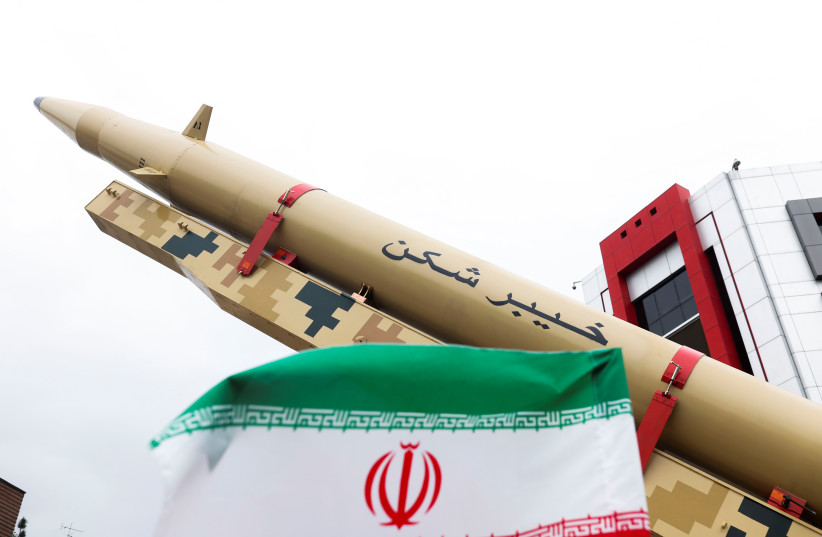At an Iranian Army Day parade, last week, President Ebrahim Raisi said that if the Zionist regime does any tiny action, it will result in the destruction of Haifa and Tel Aviv. Genocidal threats by the Islamic Republic of Iran are routine and longstanding. If it were any other nation in the world, there would be outrage in the United Nations and the capitals of Western European countries.
Despite the UN’s endemic antisemitism in the guise of anti-Zionism, its secretary-general, Antonio Guterres, has said the right things about the lessons of the Holocaust, its unprecedented horror and calculated cruelty.
He described rising antisemitism, intolerance and proliferating Holocaust denials, “We must never forget that the Holocaust could have been prevented. The desperate pleas of the victims fell on deaf ears. Too few spoke out, too few listened – fewer still stood up in solidarity.”
So does the world take the threats of the Islamic Republic against Jews seriously?
The answer is, sadly, no.
With Holocaust Remembrance Day just commemorated, a reminder to humankind that the most horrible things are still possible even now, it is an appropriate time to compare and contrast the genocide of Jews by the Nazis and the potential genocide of the Jewish nation with an Iranian nuclear weapon.

For most people born after World War II, the horror of a comprehensive plan that murdered one and a half million Jewish children, sometimes face to face with their murderers, is too painful to contemplate. The Holocaust has been relegated by time to just another historical event that, at best, school children learn.
Still, the vast majority of people in the Western world who want to live everyday lives choose to believe it could never happen again or fathom its magnitude. Even worse, more and more people don’t know about the genocide or think it is exaggerated, if not invented.
The Iranian desire to destroy the Zionist entity, Israel, will soon be possible, as Iran has the know-how to build a bomb, the nuclear material for multiple weapons, the means to deliver them and only a few technical issues to compartmentalize the atomic material on a warhead.
THE IMAGINATION needed to understand the horror of nuclear genocide is at best theoretical and certainly not visceral, for people who sit safely in the West, especially when the threat is not in your backyard or against your nation.
Defenders of Iran’s quest for nuclear weapons claim they are a rational regime. They want atomic weapons only to dissuade their adversaries, whether Sunni, Zionist or American, from attacking their country or fomenting a regime change.
This has been the Achilles’ heel of Western strategic thinking, presuming Iran is a rational state actor that would never resort to genocide. It is a rational actor, but one that follows a 1979 version of Twelver Shi’ite end-of-days philosophy. It is a revolutionary ideology whose desire to destroy Israel is baked into its DNA. This regime’s potential use of nuclear weapons should be considered real, not theoretical.
In the aftermath of forever Middle East wars and failed intelligence about weapons of mass destruction, Americans and Europeans would rather put their heads in the sand about the true nature of Iran. After all, they are not in the crosshairs of the Iranian Revolutionary Guards Corps (IRGC) nuclear ambition.
Commander of the IRGC, Maj. Gen. Hossein Salami says openly, “This sinister regime must be wiped off the map and this is no longer... a dream [but] it is an achievable goal.”
“This sinister regime must be wiped off the map and this is no longer... a dream [but] it is an achievable goal.”
Hossein Salami
The lesson of the Holocaust, which the West forgets, is that it never ends with the Jews. Just ask the other victims of the Nazis: homosexuals, intellectuals, disabled people and anyone who didn’t think or look like an Aryan.
The lesson for Israel, a Jewish state of seven million Jews who have a nuclear crosshair on their nation, is that you must not be lulled into the idea advocated by many in the West that mutually assured destruction, which worked in the Cold War, will counterbalance the Iranian threat.
Israel’s window of opportunity to delay the Iranian nuclear program may still be open. If that is the case, it is incumbent on the Israeli leadership to do the most crucial thing a nation can do and protect its citizens from a genocidal enemy. That is what I expect of my government. And if it makes the anti-Israel Left feel better, preemptive action would save millions of Palestinian lives that would be lost in an Iranian nuclear attack.
The writer is the director of MEPIN (Middle East Political Information Network). He regularly briefs members of the US Congress and their foreign policy aides. He is a senior security editor for The Jerusalem Report.
